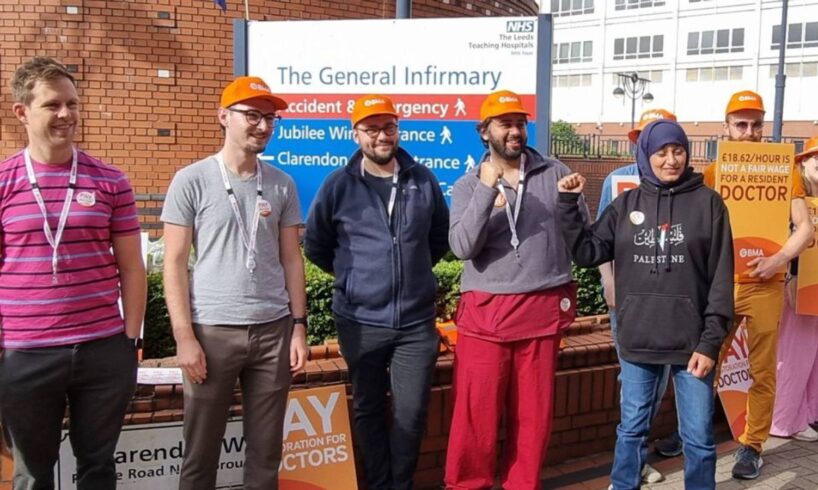
Resident doctors in England began a five-day strike on Friday against the continued erosion of their pay, terms and conditions. They are fighting a sustained assault on the National Health Service (NHS) that is being escalated by Keir Starmer’s Labour government through privatisation and massive funding cuts.
Resident doctors are qualified medical practitioners engaged in postgraduate training or employed in non-training posts.
WSWS reporters spoke to resident doctors on picket lines in the north of England about the issues that have led to this week’s industrial action.
At Manchester Royal Infirmary (MRI), our reporters spoke with Olivia, a resident doctor for six years, who held a placard showing the raft of fees that newly qualified doctors must pay. She rebutted the lies of the media and Labour Health Secretary Wes Streeting that doctors are highly paid and “privileged” and should therefore accept the government’s below-inflation pay offer.
Olivia on the MRI picket line
Olivia said, “First, we have to pay £350-£500 exam fees. We have to do four or five exams before becoming a consultant. And the exam failure rate is high—40 percent!
“Then we have to pay Royal College fees, £300-£700 a year depending on the college, and GMC [General Medical Council fees] of £420 a year, and every single doctor has to pay.
“We have to pay our [legal] defence union fees, £80-£200 a year, if there is a complaint against us. Then you have to move all over the country, so we have to pay travelling expenses and moving our stuff.
“We have to pay for our equipment, so a stethoscope costs £100-£300. Me and my husband have to pay for childcare costs, including weekends and nights—it’s very expensive. We also have student loans, at £1,200 to £4,000 a year payable over 30 years.
“We have to pay for car parking fees, £200-£500 a year. Mandatory training courses cost £500 a course. Those are the fees we have to pay every year.”
Resident doctor Animesh said, “I’m here in support of my residents and colleagues.
“If you look, the base pay now with the sort of imposed uplift is £18.60 for an FY1 doctor. I’m an FY1 doctor. If you try and compare that across to other sectors, does that really seem fair? People keep bringing a narrative, again, of having a secure job for the rest of your life, but it is anything but secure at the minute.
Animesh
“The bottlenecks at various stages of training does not guarantee progression anymore. They keep saying that doctors progress from one band to the other [and that] it’s almost guaranteed pay progression. It’s not the case. We have annual competencies and a review of where we are as a clinician that we need to undertake. We need to show that we are maintaining our skills. These exam-related costs we have to pay out of our own pockets. So it’s not as straightforward as people think it is.
“In order to get access to a mess, to warm our food, to have coffee and drinks, we need to pay for that as well out of our pay-check. It’s not something that the hospital pays for. You pay £8 a month to be able to warm your food up in a microwave. To get a space to be able to spend your shift break.
“The narrative seems to be that ‘Oh, it’s not just the base pay that we get paid’ and that we have ‘guaranteed bonuses’. They’re anything but guaranteed. So, the hours really depend on the specialty that you work in, and the setting… If you’re in a hospital or acute specialty, you have to work 48 hours. There’s no way around it. And that’s averaged out. It’s not the case it’s 48 hours per se every week. It can very well be 60 hours a week. It can be 70 hours a week.
“We have to work weekends. We have to work nights, 365 days, provide cover over bank holidays, miss festive periods. We have to fight for leave… You’d imagine if you apply for leave well in advance, you should be able to get it. However, if you’re on one of the so-called pay enhancement attracting shifts, you need to either exchange that with a colleague or basically forego.”
Animesh also described the crisis in the mental health sector, “I’m currently on my psychiatric rotation, doing general psychiatry. Community mental health is a big example of where things are not going the way they should be.
Resident doctors picket line at MRI, July 25, 2025
“The amount of turnover we have among community mental health staff, especially. community psychiatric nursing, has been insane. Constant staff turnover makes it difficult from a therapeutic relationship point of view, especially with the most vulnerable people in our society. It takes time to establish. And if we are not able to retain our staff, if we’re not able to give them conditions that they deserve and that they have worked and trained for, it’s far from ideal how things are on the ground as opposed to what you learn theoretically in university, isn’t it?
At Leeds General infirmary, first year nursing student Iqra said of the WSWS leaflet distributed on the picket line, “What stood out in your article is that 92 percent of nurses are saying that low pay is causing them financial and mental health problems.
“Being a first-year nursing student myself, and reading on nurses’ forums, I’ve been able to see first-hand that things like the pay-to-work ratio is not fair. I’ve read where people, after doing such an intense degree, after doing thousands of hours in clinical practice, and in work experience, are now considering total career changes, because the pay isn’t there.
Striking resident doctors on the picket line at LGI, July 25, 2025
“And also, if a resident doctor is making £18.62 an hour, with the stress they face, you can’t blame doctors who are considering emigrating. You can’t blame them for considering a career change and giving it up altogether. It is a growing problem, and we need some improvement there.
“We, in the healthcare system, are the bread and butter of the country. That’s one thing the NHS were praised for and if the pillars of the NHS, the staff of the NHS, are not happy, are leaving, are burnt out, it’s only going to have a domino effect, and things are going to start to crumble. And if people are emigrating, if we’re going to put money into educating students only for them to leave and look for benefits elsewhere, we need to ask what benefit do we have for them here?
“If we have the money to fund wars, if we have that money in the budget, then it should go to what matters. I believe it should go to funding health in this country and not making war in other countries.
“Nurses, doctors and other health workers should all come together to protect the NHS. Otherwise, it’s divide-and-conquer. But if we all come together, they can’t divide and conquer us, can they? And if all of us are shouting at once, it’s a loud voice, isn’t it? If that puts pressure on the government to make a difference, then that’s what we should do.”
“Why should the rich decide how our money is spent? Because I feel like the ones that can afford private health care are not going to really care, are they? I feel like, the ones that care, the resident doctors, the nurses, they’re the ones that make the difference, the everyday man, the working class man. And I feel like the ones that are in power should consider the ones that put them in power.”
Join the fight for socialism!
Fill out the form to be contacted by someone from the WSWS in your area about getting involved.





